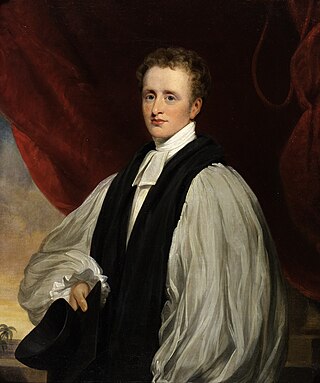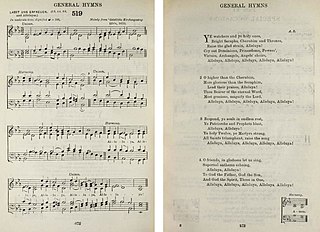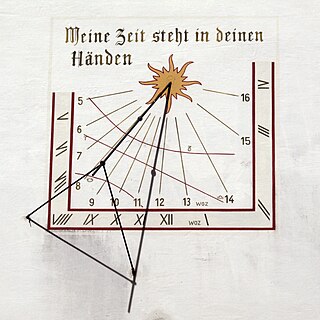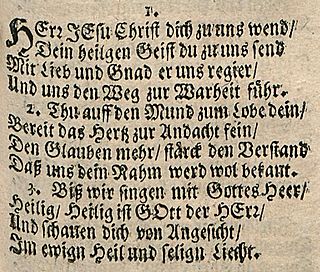
A hymnal or hymnary is a collection of hymns, usually in the form of a book, called a hymnbook. They are used in congregational singing. A hymnal may contain only hymn texts ; written melodies are extra, and more recently harmony parts have also been provided.

"Be Thou My Vision" is a traditional Christian hymn of Irish origin. The words are based on a Middle Irish poem that has traditionally been attributed to Dallán Forgaill.
Cwm Rhondda is a popular hymn tune written by John Hughes (1873–1932) in 1907. The name is taken from the Welsh name for the Rhondda Valley.

A Christian child's prayer is Christian prayer recited primarily by children that is typically short, rhyming, or has a memorable tune. It is usually said before bedtime, to give thanks for a meal, or as a nursery rhyme. Many of these prayers are either quotes from the Bible, or set traditional texts.
Phos Hilaron is an ancient Christian hymn originally written in Koine Greek. Often referred to in the Western Church by its Latin title Lumen Hilare, it has been translated into English as O Gladsome Light. It is one of the earliest known Christian hymns recorded outside of the Bible that is still in use today. The hymn is part of vespers in the Eastern Orthodox Church and the Byzantine Rite of the Catholic Church, and also included in some Anglican liturgies and Lutheran hymnals.

"We Gather Together" is a Christian hymn of Dutch origin written in 1597 by Adrianus Valerius as "Wilt heden nu treden" to celebrate the Dutch victory over Spanish forces in the Battle of Turnhout. It was originally set to a Dutch folk tune. In the United States, it is popularly associated with Thanksgiving Day and is often sung at family meals and at religious services on that day.
Veni Creator Spiritus is a traditional Christian hymn believed to have been written by Rabanus Maurus, a ninth-century German monk, teacher, archbishop, and saint. When the original Latin text is used, it is normally sung to a Gregorian Chant tune first known from Kempten Abbey around the year 1000. The hymn has been translated and paraphrased into several languages, and adapted into many musical forms, often as a hymn for Pentecost or for other occasions that focus on the Holy Spirit.
"For the Beauty of the Earth" is a Christian hymn by Folliott S. Pierpoint (1835-1917).

"Holy, Holy, Holy! Lord God Almighty!" is a Christian hymn written by the Anglican bishop Reginald Heber (1783–1826).

"Ye Watchers and Ye Holy Ones" is a popular Christian hymn with text by Athelstan Riley, first published in the English Hymnal (1906). It is sung to the German tune Lasst uns erfreuen (1623). Its uplifting melody and repeated "Alleluias" make this a favourite Anglo-Catholic hymn during the Easter season, the Feast of All Saints, and other times of great rejoicing.

"The Hymn of Joy" is a poem written by Henry van Dyke in 1907 in being a Vocal Version of the famous "Ode to Joy" melody of the final movement of Ludwig van Beethoven's final symphony, Symphony No. 9.

Psalm 31 is the 31st psalm of the Book of Psalms, beginning in English in the King James Version: "In thee, O LORD, do I put my trust". In Latin, it is known as "In te Domine speravi". The Book of Psalms is part of the third section of the Hebrew Bible, and a book of the Christian Old Testament. In the slightly different numbering system used in the Greek Septuagint version of the Bible, and in its Latin translation, the Vulgate, this psalm is Psalm 30. The first verse in the Hebrew text indicates that it was composed by David.

"Holy God, We Praise Thy Name" is a Christian hymn, a paraphrase of the Te Deum.
"Crown Him with Many Crowns" is an 1851 hymn with lyrics written by Matthew Bridges and Godfrey Thring and sung to the tune 'Diademata' by Sir George Job Elvey. The hymn appears in many hymnals.

"Lasst uns erfreuen herzlich sehr" is a hymn tune that originated from Germany in 1623, and which found widespread popularity after The English Hymnal published a 1906 version in strong triple meter with new lyrics. The triumphant melody and repeated "Alleluia" phrases have supported the tune's widespread usage during the Easter season and other festive occasions, especially with the English texts "Ye Watchers and Ye Holy Ones" and "All Creatures of Our God and King".

"Herr Jesu Christ, dich zu uns wend" is a Lutheran hymn from the 17th century. Its hymn tune, Zahn No. 624, was adopted in several compositions. It was translated into English and is part of modern hymnals, both Protestant and Catholic.

"Allein Gott in der Höh sei Ehr" is an early Lutheran hymn, with text and melody attributed to Nikolaus Decius. With the reformers intending church service in German, it was intended as a German version of the Gloria part of the Latin mass, used in almost every service. Decius wrote three stanzas, probably in 1523, while a fourth was added, probably by Joachim Slüter.

"Macht hoch die Tür" is a popular German Advent hymn, written in 17th century Ducal Prussia. The lyrics were written by Georg Weissel in 1623 for the inauguration of the Altroßgärter Kirche in Königsberg. The melody that is now associated with the text appeared first in 1704 in the hymnal by Johann Anastasius Freylinghausen.
"Herr, mach uns stark" is a Christian hymn in German with text by Anna Martina Gottschick written in 1972. The hymn for the end of the church year is sung to the melody "Sine Nomine" by Ralph Vaughan Williams. It is contained in the Catholic hymnal Gotteslob, concluded with an added sixth stanza by Jürgen Henkys. The first line is "Herr, mach uns stark im Mut, der dich bekennt".















